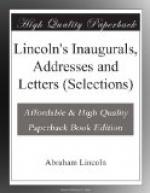Lincoln’s later reading shows considerable variety within certain limits. He himself once remarked that he liked “little sad songs.” Among, his special favorites in this class of poetry were “Ben Bolt,” “The Lament of the Irish Emigrant,” Holmes’ “The Last Leaf,” and Charles Mackay’s “The Enquiry.” The poem from which he most frequently quoted and which seems to have impressed him most was, “Oh, Why Should the Spirit of Mortal be Proud?” His own marked tendency to melancholy, which is reflected in his face, seemed to respond to appeals of this sort. Among his favorite poets besides Shakespeare were Burns, Longfellow, Hood, and Lowell. Many of the poems in his personal anthology were picked from the poets’ corner of newspapers, and it was in this way that he became acquainted with Longfellow. Lincoln was especially fond of humorous writings, both in prose and verse, a taste that is closely connected with his lifelong fondness for funny stories. His favorite humorous writer during the presidential period was Petroleum V. Nasby (David P. Locke), from whose letters he frequently read to more or less sympathetic listeners. It was eminently characteristic of Lincoln that the presentation to the Cabinet of the Emancipation Proclamation was prefaced by the reading of the latest Nasby letter.




